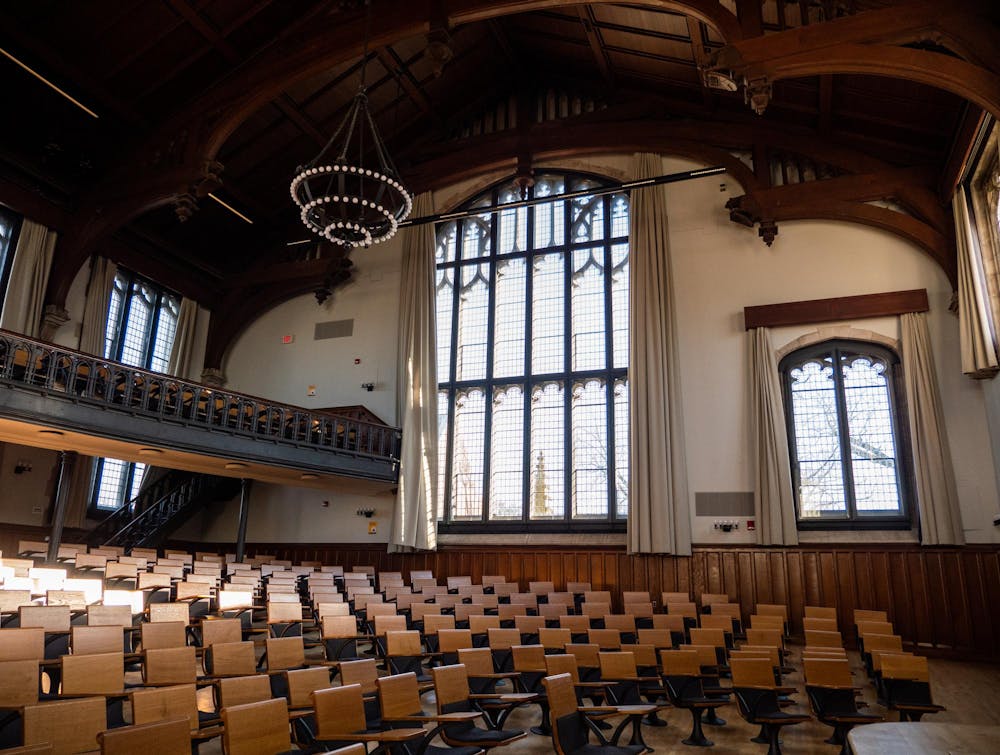Following last spring’s wave of pro-Palestine protest activity, a group of faculty officially launched the Princeton Council on Academic Freedom (PCAF) this fall. Its goal is to “foster and defend academic freedom and intellectual pluralism” at Princeton. After a recent flurry of activity from the council, The Daily Princetonian spoke to some of its members to learn more about the organization’s formation, and what it aims to accomplish on campus.
According to PCAF Co-Chair and Professor of Classics Emmanuel Bourbouhakis, plans to form PCAF developed in Spring 2023 after University President Christopher Eisgruber ’83 and Dean of the Faculty Gene Jarrett asked a subcommittee of the Faculty Advisory Committee on Policy (FACP) to establish a policy for departments and other units issuing political statements.
This measure was proposed at the May 15, 2023 faculty meeting, but the meeting adjourned without a vote on the proposal. According to Bourbohakis, “The administration eventually chose to withdraw the proposals pending further consideration.”
“It was in the wake of this attempt to entrench statements at every level that a number of us became galvanized, eventually taking a cue from colleagues at Harvard and Columbia, and decided after a series of informal discussions to form PCAF,” he added. Harvard adopted institutional neutrality in September, and Columbia is currently considering it.
“This committee was formed recently due to the situation that has been happening over the last year on campus,” addd PCAF member and Professor of Astrophysics Neta Bahcall, pointing directly to the “Gaza Solidarity Encampment” and Clio Hall sit-in that occurred last spring. “Faculty gather to vote on various topics that are not really under their jurisdiction.”
Bourbohakis clarified in a follow-up email to the ‘Prince’ that PCAF would not have objected to a proposal granting students amnesty for students arrested for their participation in the Clio Hall sit-in, but would object to the faculty proposals for calling for the University to divest and dissociate from Israel, cultivate affiliations with Palestinian academic institutions and create a Program in Palestinian Studies, and publicly support ceasefire.
He stated that PCAF believes these proposals are “outside the bounds of the jurisdiction of the faculty as a voting body and which would have raised fundamental questions of academic freedom, had they been permitted to come to a vote.”
Notably, a non-binding resolution calling for amnesty passed at the May 20 faculty meeting, but the others did not make it onto the agenda. Two similar pro-Palestine referenda — calling for the creation of an ad-hoc committee to review the University’s response to protest in Spring 2024 and the establishment of an initiative to support Palestinian, Arab, and Arab-American University community members — were introduced at the Oct. 21 faculty meeting by Professor of Classics Dan-el Padilla Peralta ’06. Faculty voted to postpone the consideration of these measures until the Apr. 28 faculty meeting.

Padilla Peralta did not respond to a request for comment.
“I understand why some faculty associated with the protests surrounding the conflicts in the Middle East regard PCAF with suspicion, since our efforts would effectively prevent the kind of proposals they have been championing,” Bourbohakis wrote. “But our objection is not to the specific political content of those proposals but to any proposals of this kind.”
“The [U]niversity should not have a foreign policy, and faculty meetings are not intended for freewheeling political debates on the rights and wrongs of the Middle East or broadly social and political matters,” he continued.
PCAF has been particularly active in recent weeks. At the Oct. 21 faculty meeting, Professor of Politics and Public Affairs Jonathan Mummolo, who also serves as a PCAF co-chair, put forward a PCAF-backed proposal that would amend the Rules and Procedures of the Faculty to prevent faculty-wide statements.

According to Bourbouhakis, Mummolo’s measure was backed by PCAF because as long as faculty-wide statements are allowed, meetings will “devolve into a fractious political arena simply because any group of faculty choose to force a vote on any matter they feel passionate about.”
More recently, PCAF members wrote a column criticizing the use of faculty meetings to declare political positions. This came less than two weeks before faculty were asked to vote on the aforementioned pro-Palestine referendum proposed by Padilla Peralta.
Besides their goal to defend institutional neutrality and academic freedom, Mummolo told the ‘Prince’ that a second goal of PCAF is to promote civil discourse, writing, “We also plan to promote and host events that model civil but critical debates on contentious issues.”
“Personally, I do not think we have enough events like this on campus presently,” he added. “Universities should lead the way in modeling civil disagreement even on the most sensitive of issues, and I am hopeful PCAF can play a role in that.”
Achilleas Koukas is a News contributor for the ‘Prince.’
Olivia Sanchez is an associate News editor for the ‘Prince.’ She is from New Jersey and often covers the graduate school and academic departments.
Please send corrections to corrections[at]dailyprincetonian.com.
Correction: A previous version of this story stated that PCAF was a committee. It is a group of faculty, not an official committee. Additionally, it stated that the amnesty proposal passed. In fact, it passed as a non-binding resolution. Finally, it stated that pro-Palestine referenda from the spring were re-introduced at the Oct. 21 meeting. In fact, the proposals at the Oct. 21 meeting were modified. The ‘Prince’ regrets these errors.








